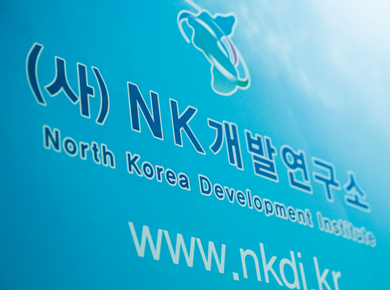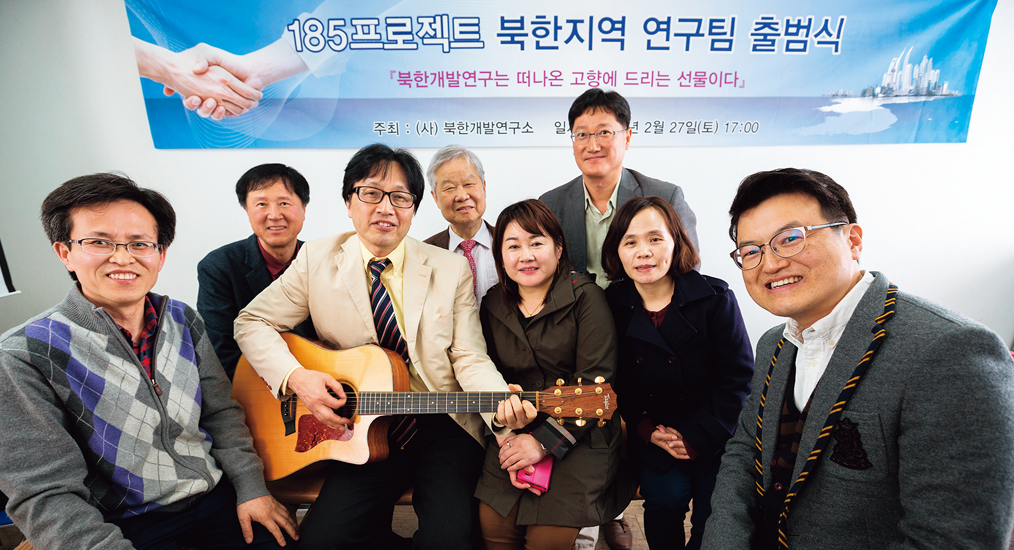The researchers at the North Korea Development Institute (NKDI) are preparing “gifts” for their hometowns that they have left behind in North Korea. They believe that they are paving the way to national unification through their research activities. They see their work as practical knowledge building as foundation for development by gathering and analyzing microeconomic data on North Korean regions.

Project 185 is the North Korea Development Institute’s core program. The think tank is building up an extensive database on all small and mediumsized cities in the North through this project, as a basis for planning balanced development of post-unification North
Korean regions.
Alarge sign greets visitors to the fourth-floor penthouse of a building on Chungmu-ro street in the Jung-gu district, central Seoul. This is home to the fledgling think tank named the North Korea Development Institute (NKDI). The sign’s message reads: “Research and development on North Korea is the best gift we can give to our hometowns we’ve left behind.” A blow-up photo of Cheonji, the crater lake at the top of Mt. Paektu, draws one’s eyes upon entering the office of the institute’s director, Kim Byungwook. A Google map of Musan County, a coal mining town near the Tuman River along the North Korea-China border, hangs on the wall of an adjoining office. Musan is the hometown of Jeon Seung-chul, a North Korean defector, whose experience of adjusting to life in the South was made into a film, “The Journals of Musan,” in 2011.
Defector Intellectuals
The NKDI was founded by a group of intellectuals who had defected from North Korea, in order to support the development of small and medium-sized cities in the North. Its founding was initiated by Kim Byungwook, the first North Korean defector who has earned a doctoral degree in the South. The institute was registered with the Ministry of Strategy and Finance in December 2014, another first in the defector community, where most other organizations are registered with the Ministry of Unification. As befits a think tank, the NKDI boasts the most highly educated members among all defector groups.
In late 2012, ten North Korean defectors met at Hanawon, the government-run settlement support center for North Korean refugees. They agreed to conduct research on development strategies for the North so that, upon unification, they could return to their hometowns and help their compatriots to enjoy the quality of life that they have come to experience in the South. The following year, they organized an academic club that consisted of defectors with master’s or doctoral degrees.
They have a solid dream. With their academic backgrounds and capabilities, these North Korean defectors believe they have the opportunities, resources, and energy needed to create a storehouse of knowledge to guide the economic reconstruction of their hometowns. Just as the Korea Development Institute (KDI) played a key role in the making of the “Miracle on the Han River” in the 1960s and 70s, they intend to develop the NKDI as a think tank at the forefront of efforts to create a “Miracle on the Taedong River” in the North.
“It’s no exaggeration to say that defectors have so far been used merely as tools or resources for North Korean studies by South Korean academics. But
it’s now necessary for us, defectors with more education, to take the initiative and conduct our own research,” Kim said, explaining his motivation. “We have the most accurate information on the North. We will put our heads together to make the NKDI a top-notch think tank as far as North Korean studies are concerned.”
Kim’s wife, Kim Yeong-hee, is also a member of the NKDI research staff. She also serves as the chief North Korean economic studies researcher at the
Korea Development Bank’s inter-Korean projects division. The Kims crossed the Tuman River with their two young children in August 2002. They had been marginalized by the hierarchical structure of North Korean society, where only the elite class can get ahead. Kim is a graduate of Pyongyang University of Mechanical Engineering, but he lived in Nampo, South Pyongan Province and Chongjin, North Hamgyong Province after being ousted from Pyongyang in the early 1990s, just because his family did not have an elite status and his relatives were known to live in China. “I decided to escape from the North for concerns about my children’s future rather than my own career,” Kim said.
After settling down in Seoul, Kim and his wife both earned master’s degrees from the Graduate School of North Korean Studies at Kyungnam University and doctorates from Dongguk University’s Department of North Korean Studies. They were the first defector couple to receive PhDs on North Korean studies in South Korea.
‘Project 185’
The NKDI is composed of 20 researchers — five with PhDs, 12 doctoral candidates, and three candidates for master’s degrees — 13 of whom are women. Most of them are in their 40s and also have full-time or part-time jobs outside of the NKDI. They come to the institute on weekends for research activities or discussions, while also working as vice principals at alternative schools, teachers, or office workers. Their specialties range from economics and military studies to pedagogy, sociology, political science, and culture and arts. Only three of the staff, including Kim Byung-wook, work full time at the institute. Interestingly, a Japanese national lends support to the institute as an outside director.
The NKDI is currently focusing on studying 185 “microregions,” whichinclude 38 municipal districts and 147 counties throughout North Korea. It plans to launch 12 regional research teams, which will study the cities and provinces in these 185 regions, within this year.
“It’s essential to narrow the regional gap between the two Koreas to achieve national unification,” Kim said. “To this end, we’re planning to gather basic geographic information that will be vital for the development of small and mediumsized cities in the North.

The doorplate at the North Korea Development Institute, located in Chungmu-ro, central Seoul.
For now, we will launch Project 185, a program to develop a spatial and geographic database for all of the 185 cities and counties. This database will provide vital fundamental data on which to work out development strategies for the North Korean regions before and after unification. For example, just as South Korea’s coal town of Jeongseon in Gangwon Province has been turned into a tourist destination, it’ll be possible to develop coal towns in the North in similar ways.”
The gathering of basic data on North Korean cities
and counties is an essential task, he says. Regional
studies can be meaningful only when past, present, and
future data about individual regions are available.
“Our researchers aren’t doing research on their
own hometowns simply out of academic curiosity,” Kim
noted. “Our research is a means to show our persecuted
compatriots living on the other side of the Demilitarized
Zone what kind of life we are leading in South
Korea. We also want the public to know about what we
are really doing.”
Achievements and Future Plans
The NKDI has laid the foundation for the study of urgent issues by holding four seminars in cooperation with Kyungnam University’s Institute for Far Eastern Studies and the Korea Research Institute for Human Settlements (KRIHS) last year. The themes of the seminars were “Ways to gather fundamental data needed for the development of small and medium-sized cities in North Korea,” “Ways to build a database needed for the development of small and medium-sized cities in North Korea,” “Ways to develop small and mediumsized cities in North Korea,” and “How to promote infrastructure development for the residents in our hometowns.”
Research results have been published in a series of seven volumes, titled “Research for the Future of Our Hometowns.” They are “Investment in Hamhung, a Second Pyongyang and a City of Chemical Industry” by Wi Yeong-geum, a doctoral student at the Graduate School of Politics and Policy, Kyonggi University; “Investment in Sunchon, South Pyongan Province as a Logistics Hub of the Korean Peninsula” by Hong Seongwon, a doctoral student at the University of North Korean Studies; “Investment in Chongjin, a Hub of the Iron and Steel Industry in Northeast Asia” by Kim Hyeok, a doctoral candidate at the Academy of Korean Studies; “Investment in Undok County, a Land of Black Gold” by Lee Hye-ran, a doctoral student at Sungkyunkwan University; “Stimulating Tourism to Mt. Paektu and Development of Hyesan” by Eom Hyeon-suk, a researcher who has completed a doctoral course at the University of North Korean Studies; “Development of Kyongsong County, a Hot Spring Tourism Hub” by Yun Seung-bi, a doctoral student at Kyung Hee University; and “A Vision for Haeju Seen through its Development Potential” by Kwak Myeong-il, a researcher who has completed a doctoral course at the University of North Korean Studies.
The NKDI conducted research last year at the request of government agencies and private organizations under such themes as “Analysis of construction technologies in the North,” “Strategies for infrastructure development in Musan based on spatial information,” “Analysis of the current situation of the North,” and “Securing a beachhead for evangelization in Wonsan based on spatial information.” This year’s schedule is filled with various projects on subjects including “The present state and future of open markets in the North,” commissioned by the Presidential Committee for Unification Preparation, “Changes that occurred to the Catholic Church in the North after liberation,” and “Research on how to secure a beachhead for evangelization in the North.” In addition, the institute is also planning to gather basic data on Hyesan.
As of late 2015, 19 North Korean defectors held doctoral degrees and another 60 had master’s degrees. Kim plans to add more substance to the institute’s research on the development of infrastructure in the North by encouraging these defector intellectuals to proactively engage in North Korea-related research. He also envisions international programs to support the development of the North, if things turn out well for the institute.
They have a solid dream. With their academic backgrounds and capabilities, these North Korean
defectors believe they have the opportunities, resources, and energy needed to create a storehouse of
knowledge to guide the economic reconstruction of their hometowns.
Hurdles to Overcome
This year, the NKDI hit a few snags. First, the international community and South Korea imposed sanctions on the North for its fourth nuclear test and longrange rocket launch. There have been huge repercussions from the suspension of inter-Korean cooperation projects, including the closing of the Kaesong Industrial Complex and halting of the Rajin–Khasan logistics project between the North and South Korea and Russia. Inter-Korean exchanges have been frozen, as the North Korean regime also declared all inter-Korean agreements on economic cooperation and exchange projects void.
The stalled inter-Korean relations have created negative consequences for now, but the NKDI researchers are not demoralized. To the contrary, they regard the current situation as an opportunity for them to build up their own capabilities. They intend to strive for even higher standards, believing that the tense inter-Korean relations can make the knowledge accumulated by NKDI even more valuable in the future. To this end, the institute hosted an international symposium on the theme, “North Korea in the wake of the imposition of UN sanctions for its nuclear weapons development,” in March as its first-quarter seminar for this year.

NKDI researchers relax after a lengthy discussion on how to carry out a research program titled “The present status and future of open markets in North Korea,” assigned to their institute by the Presidential Committee for Unification Preparation this year. Kim Byung-wook, the first director of the think tank, is at far left.
Biases and misunderstandings held by South Korean government officials and opinion leaders are huge hurdles that must be overcome. Typical misperceptions include that everything in the North, including its urban infrastructure, needs to be rebuilt after unification of the two Koreas; defector researchers are not qualified to conduct research on the North because they have been away from their homeland for many years; and the NKDI is only duplicating data already possessed by the National Intelligence Service. Furthermore, despite its clearly different areas of emphasis from the Korea Research Institute for Human Settlements, there are some who believe that the NKDI’s research projects overlap those of the KRIHS, a government-funded think tank that specializes in the study of macroeconomic policies.
Kim believes that due to such widespread prejudices, no decision has yet been reached on the NKDI’s request to the National Research Foundation of Korea for a research support fund of 200 million won. He now hopes that the government will provide medium and long-term support to Project 185. Although he has now lived in the South for 14 years, Kim still finds it difficult to determine whether South Koreans are merely paying lip service to his
cause. He doesn’t know if they really intend to help him when they say, “Give me time to think what kind of help I can give you,” or “Let’s meet some time in the future,” or “Let’s have dinner together some day.” North Koreans, he points out, usually use straightforward s rather than communicate in a roundabout style as South Koreans often do.
In spite of their persistent financial difficulties, NKDI researchers are gratified by the support they have received from various individuals. Yang Bong-jin,
former president of Hyundai Energy and Resources, provides rent-free office space for their use. Seoul’s Jung-gu District Office is paying their utility bills.
And Kim Tae-sik, president of CSIN Tech, has donated tens of millions of won to support their research. Kim Byung-wook lifts the spirits of the researchers by having everyone keep their focus on the big prize: “We’re now nearly emptyhanded. But let’s pave the way for the development of our hometowns with unwavering determination.”
“And though thy beginning was small, yet thy latter end should greatly increase” (Job 8:7). This hopeful verse from the Bible sprang to my mind as I was leaving Kim’s office.